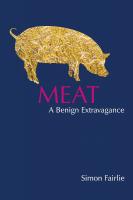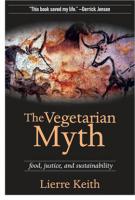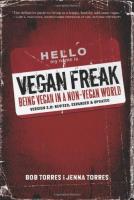 These books offer three very different perspectives on the exploitation of animals for food by humans: one from a land activist (Fairlie), one from an angry ex-vegan (Keith), and one written by passionate animal rights advocates (Torres and Torres).
These books offer three very different perspectives on the exploitation of animals for food by humans: one from a land activist (Fairlie), one from an angry ex-vegan (Keith), and one written by passionate animal rights advocates (Torres and Torres).
Putting my cards as reviewer on the table, I’m philosophically an omnivore though practically a near-vegetarian; my agricultural experience is limited to growing up in Somerset and tending an under-producing allotment for 10 years; and professionally I have been involved with scientific studies of human growth and diet.
In his book, Simon Fairlie, former editor of The Ecologist and current editor of The Land, takes us on an in-depth, technical exploration of the reasons why, in his view, the agriculture that both humanity and the planet needs is one that necessarily includes a measure of livestock farming. Fairlie draws both on his first hand experiences working the land and an editor’s aptitude for analysis and summary.
A vegetarian himself in his youth, Fairlie credits vegans for opening up the debate on livestock in agriculture and for prompting his systematic look at the underlying issues. He argues that the follies of the livestock industry – the feeding of grain to cattle and pigs, use of meat in cattle feeds, the primacy of cattle over other livestock, etc – do not necessarily argue against eating meat, but against current farming models. Fairlie agrees with decreasing the amount of meat we eat, but his arguments are not ethical but pragmatic, namely, the environment, our health, and the best use of available productive land.
He identifies errors in previous analyses of the efficiency of meat production and concludes that the claimed greater nutritional yield, and lower water demand, of plants versus animals per acre is not as significant as previously thought.
If we stop feeding grain to animals, Fairlie thinks we could still produce around half the current global meat supply, and end up with a net gain in terms of human nutrition. Fairlie does not stop there; he goes on to explore the implications of farming models in terms of climate change, energy use, food security, and land control. The book is quite technical and dense, but the chapters stand on their own as essays, so the reader can dip in and out, rather than feel obliged to digest it all in one go.

Lierre Keith is a former vegan who believes that vegetarianism and veganism (confusingly, she uses the terms almost interchangeably in the book) have led people like her astray, and are essentially destructive myths.
Stern stuff, but the strength of Keith’s arguments do not match her rhetoric for the book is riddled with problems. Vegans think they are saving lives by not eating animal products but, according to Keith, they’re wrong because they are ignorant of the realities underlying the food they do eat, like the countless animal and plant deaths that arise from large-scale monocrops, and, indeed, the wholesale destruction of ecosystems by agriculture. Keith’s prescription is that we should accept death as part of the cycle of life, grow your own food with a mixed farming model, and work to subvert the entire project that is civilisation.
My hackles were immediately raised at the patronising and preaching tone of the book from the very start, in particular the presumption of ignorance on the part of all with whom the author disagrees. Keith explains that she suffered health problems that she attributes to 20 years’ lack of meat. She could be right in her own case, but I would observe that a) many vegans live long and healthy lives, and are very knowledgeable and sensible about dietary and lifestyle issues, and b) dietary-related health problems are not the preserve of vegans alone. For example, worldwide, over a billion people are overweight and consequently at risk of a wide range of chronic diseases, and the vast majority of these people are meat-eaters.
In making her case against veganism, Keith draws on seemingly-respectable material from fields including anthropology, archaeology, biochemistry, and nutritional science. But all too often issues are presented as statements of fact when they are clearly more nuanced issues at play. As just one example, take the following statement (p181) “Please listen: in one study, 28 percent of vegan children had rickets in the summer, and in winter it was 55 percent”.
On closer examination, the study referred to was of children on a specific macrobiotic (not explicitly vegan) diet and the study authors make no statements about veganism but do note that the high fibre nature of the macrobiotic diet probably contributed to impaired calcium absorption
Lierre Keith’s approach is to scare people by cherry-picking facts, leaping freely from anecdotes to generalisations, and setting up a succession of straw man arguments – that veganism is a quest to defeat death in its totality, that vegans are ignorant of the realities behind arable crop production, and so on.
For a book claiming to be about vegetarianism and veganism, it is mostly a rather ill-thought out mixing pot of ideas spanning gender politics, spirituality, re-localisation, anti-civilisation politics, and, ultimately, personal anger and bile.
At its heart, the book is fundamentally a vehicle for primitivist arguments – that the development of agriculture, and hence modern civilisation, was a disaster. Whilst I definitely have time for those views, in this incoherent and patronising form I would rather pass, thank you.

Vegan Freak aims to help you go vegan or stay vegan through a combination of humour, information and polemic. It didn’t convert me, but I enjoyed it , especially given its lighter touch compared to the two other books reviewed here.
I liked the way it talks about the particularities of social situations that I would imagine most vegans deal with frequently; awkward relatives who insist of making the same anti-vegan jokes at Christmas, or being lectured on how eating plants was killing too, for example.
The title, and the book itself, plays with and reclaims the idea of “freakdom”, in a way that emphasises the solidarity of shared experiences amongst vegans in the face of a generally ignorant and unsympathetic world.
Fairly early on, the book launches into the authors’ prescription for becoming vegan, which is an all or nothing three-week “cold tofu approach”.
Now I may be wrong, but I suspect this is not the best way to win folk over; a more nuanced and gradual transition to a vegan diet could be a better bet, given that the book is likely to appeal to those interested in veganism but not yet committed.
Aside from this, the book is a collection of thoughtful and helpful observations on the realities of being vegan in todays’ world, although, like Lierre Keith’s book, it presents a decidedly North American perspective that can sometimes grate against European sensibilities.
The three books actually have a lot of common ground, despite first appearances. All the authors share views on the need to recover direct connections to land and agriculture, to relocalise, and to ensure that ecological sustainability is at the heart of agriculture. They express this in very different ways.
For my part, I found Simon Fairlie’s arguments persuasive, though that’s not suprising seeing as they are the least challenging to me in terms of lifestyle change. However reading these books has prompted me to research what’s possible with vegan organic farming approaches: Lierre Keith would be furious, one suspects.

